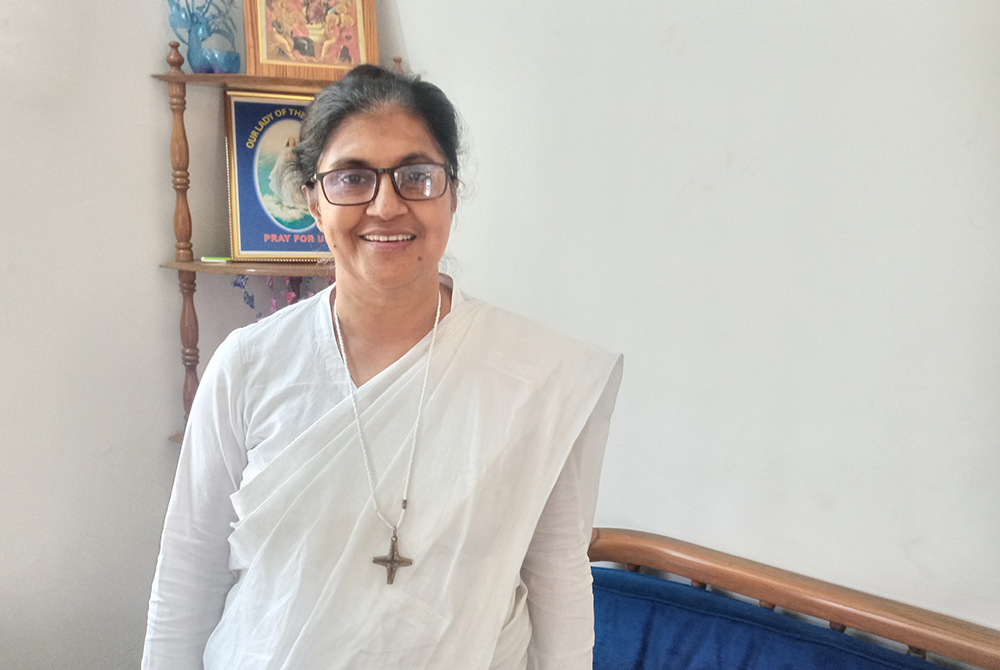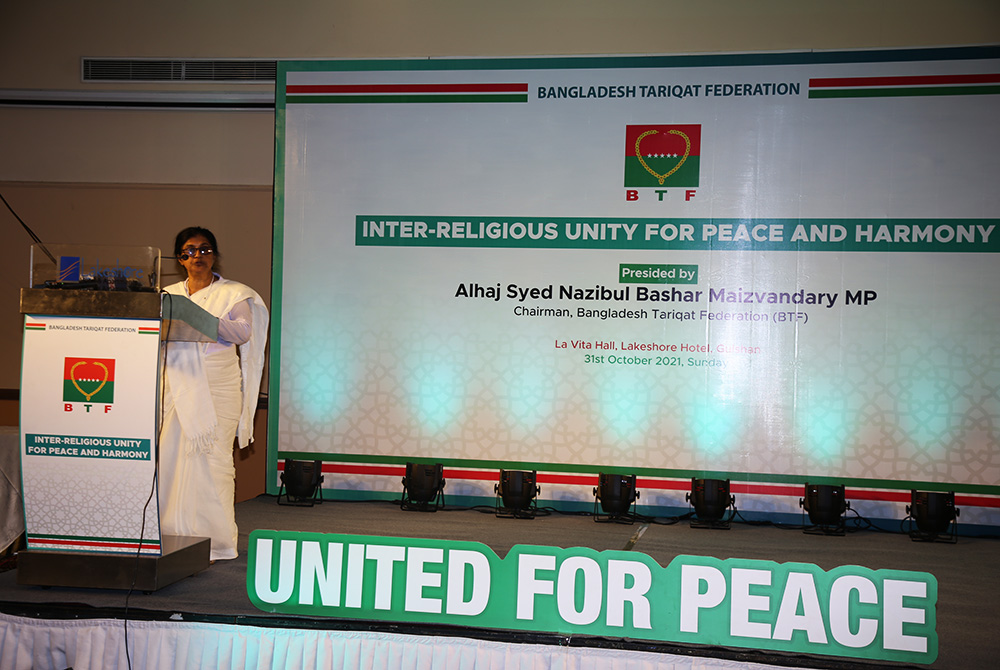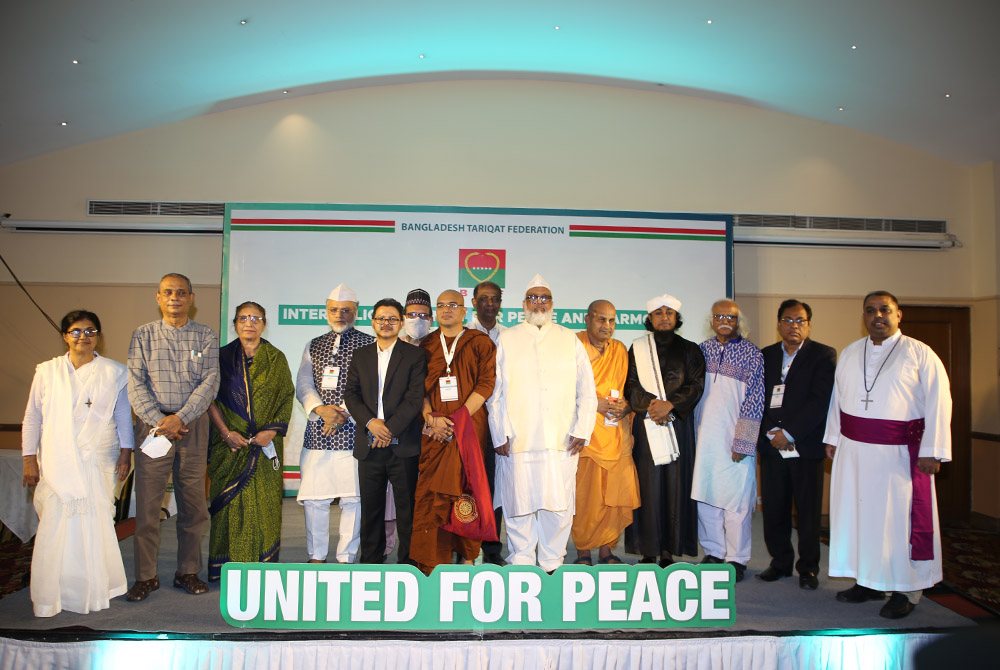
Sr. Reba Veronica D'Costa at the convent of the Congregation of Our Lady of the Missions in Dhaka, Bangladesh. She is one of four writers creating a book on interfaith harmony. (GSR photo/Sumon Corraya)
Wherever you go in the world, someone is in a religious minority.
In Bangladesh, it's the Hindus, Buddhists and Christians.
All religions strive to inspire people of other faiths. They don't seek to harm or hurt others, says Sr. Reba Veronica D'Costa, who works to spread religious harmony. D'Costa, a 63-year-old member of the Congregation of Our Lady of the Missions, spoke on interreligious unity recently in a seminar with 250 faith leaders in Dhaka. Among them were several Catholic sisters from the Congregation of Our Lady of the Missions, Holy Cross and Associates of Mary Queen of the Apostles.
D'Costa works to boost religious harmony with her wisdom. She previously has shared reflections on peace in many diverse settings, including a mosque, a Hindu temple, a Buddhist pagoda, and formation programs for congregations of Catholic religious women and men.
In Bangladesh, 90% of the people are Muslims, 8% are Hindus and the rest are Christians and Buddhists. In October, during the Hindus' biggest festival, Durga Puja, Muslim extremists continually attacked Hindus and their holy places. The attacks were spurred by a social media post that claimed that Hindus were desecrating the Quran in the city of Cummila. At least seven people died in the attacks, including two Hindus.
According to a report by a prominent human rights group in Bangladesh, 3,679 attacks on the Hindu community occurred between January 2013 and September 2021.
D'Costa, as a member of the South Asia Forum for Freedom of Religion or Belief teaches about interfaith harmony. She is writing a book on values for the Save and Serve Foundation for students from many different faith traditions. She spoke to GSR recently.

Sr. Reba Veronica D'Costa speaks in an interreligious seminar in Dhaka in late October. (GSR photo/Sumon Corraya)
GSR: How did you get involved in the interfaith dialogue activity?
D'Costa: I was born in Dhanun village, near Dhaka. During my childhood, I lived with Hindus and Muslims in a [brotherly relationship] in our village. I can recall it. After [I became] a nun, Bishop Joachim Rozario, CSC, inspired me to work with interfaith [efforts]. The [local bishop] and my congregation sent me to the Philippines to study interfaith dialogue in 1984. Through the training, I [was inspired] to work on interfaith dialogue.
On returning, I served in the formation house of our congregation, where I taught our novices and postulants about Islam. I grew in knowledge and respect for other religions [by] studying Judaism, Hinduism and Buddhism. When I was growing up in the village, I didn't understand the worth of interfaith dialogue. It touched my heart at deeper level. Gradually, people recognized me as an activist of interfaith dialogue. I received calls from the Bangladesh Tariqat Federation several times. I spoke in a huge gathering and noticed people liked my speech. Muslim, Hindu and Buddhist leaders appreciated my sharing and views for peace and harmony in our society.
Why is interfaith dialogue important?
Many people say that minority is a political term. I disagree. Human beings [can be a] minority or majority politically, [religiously], financially or other ways. The same way we see those who are the minority in the USA, they are the majority in Bangladesh. Those [who are the] majority in one country, [can be the] minority in another. While I went to Loyola University Chicago, an Indian Muslim professor said that he is the minority in India. I tried to feel with his feelings and his desire for interreligious dialogue. He said that they are fighting for their rights and religious freedom. Like him, as a minority, I also, being a Christian, feel the same. However, in Bangladesh, we are hospitable, peace-loving and forbearing people. We are working for religious freedom and our rights. When we think these things, we cannot do violence on faith minorities as we all are the minority in some ways.
Narrow-minded people make conflict using faith. They do it merely for their financial benefit. But at this point, what [can] you and I can do? I tell my teachers and students they need to respect [people of other faiths]. But it requires willpower. We can do anything by our willpower, be it good or evil. [Interfaith activity] is very important in this country. Because there is a lack of harmony and civic responsibility, that is why the police require security in our churches and temples during our Holy Easter and Christmas or festivals. If we don't have a threat, we don't need the protection of law enforcement agencies.
Do you have any plan for students so that they can learn religious harmony?
[F]our persons from Christian, Muslim, Hindu and Buddhist [traditions] will write books on religious harmony. We got a proposal from Bangladesh Tariqat Federation to write the books for elementary school. I will write it on behalf of the Christian faith. It will be a unique book. These books will be studied by all faith students. They will learn values of all faith[s]. They will learn to respect each other. We will ask authorities so that madrasa [schools for Islamic instruction] students also can study the book. In our country, often [faith minorities face] sudden attacks or threats. We have to raise our voices. In different schools, I wish to provide the class on peace and harmony through interfaith dialogue.
Advertisement
How does the Holy Spirit work through you to promote religious harmony?
Generally, I [prepare] before teaching and delivering a speech in any interfaith program. But most of the time, I discover, I speak what the Spirit inspires, at times without written notes. The Holy Spirit works inside me and inspires me. I am just an instrument of God. Those who listen to me, I believe, the Holy Spirit also speaks in their hearts and they become transformed and accept my speech. Recently, after finishing a speech, a Muslim woman came to me and said, "I want to invite you for a seminar as a speaker in our women's forum. Your words touched my heart!"
What will happen if all people of faith work engage in interfaith dialogue?
Truly speaking, people are not much aware on interfaith matters. I do feel interfaith dialogue is needed in our country. It is new and unfamiliar for many people. In our country, we grew up in dialogue of life, but dialogue of faith is much deeper and challenging. Only [through] dialogue among different faiths, people might resolve misunderstandings, [which] will bring harmony. Interfaith dialogue is a process where each [person of faith listens] to other faiths with understanding and respect. This is how peace is established among all. When [the most number of] people could learn about interfaith dialogue, I surely can say that peace will be established in our country. Gradually, we will involve political leaders, teachers, businessmen, religious leaders and other important persons in our activities. At [the] grassroots level, people need to be enlightened about peace and harmony, respecting all religions.

Sr. Reba Veronica D'Costa, far left, poses with other faith leader at the conclusion of an interfaith seminar. About 250 leaders of many faiths participated. (GSR photo/Sumon Corraya)
Do you want to say anything else about interfaith dialogue?
In the past, Crusades took place for religion. The Holy Father asked pardon for it. Muslims had jihad. People lost their valuable lives for their faith [through] Crusades and jihad. This is how human beings couldn't survive peacefully on earth. Mother Church deeply realized it. Therefore, interfaith dialogue has started in the Church. [The] Church teaches us even [to] respect those who have no religion or are atheists. Who am I to judge?
All [people of faith] now work with the interfaith [efforts] for establishing religious harmony. It is not only inside Christians, but also with other [people of faith]. Bangladesh is a secular country. We practice our own faiths, but we together celebrate festivals. If we could have deeper knowledge of other [people of faith], we could spread the message of interfaith peace and brotherhood. As a result, religious extremism will decline in our country.
Additionally, being religious, we priests and nuns should go to other [people of faith] besides our academic institutes. Most of us like to stay inside the protected area in the convent or church. If we don't enter into dialogue with them, we can't spread the message of interfaith harmony. Faith is like salt, which needs to be shared with others to bring the taste of goodness and brotherhood with courage and humility. Courage and humility go together. Being religious leaders of all faiths, we all have the responsibility to work for establishing harmony. If harmony exists, the religious conflict will never take place.







